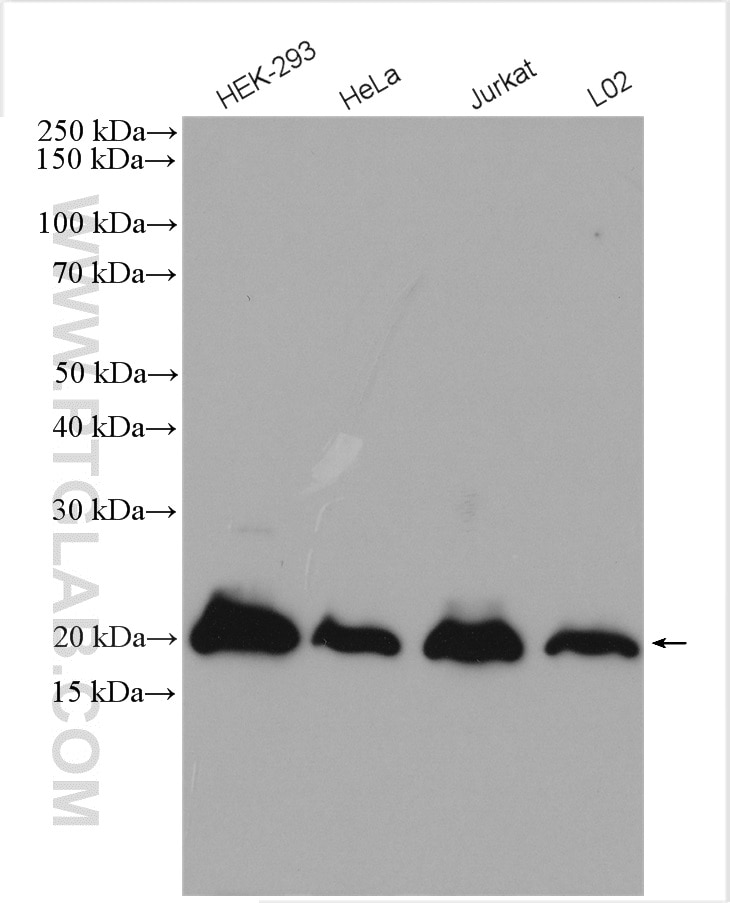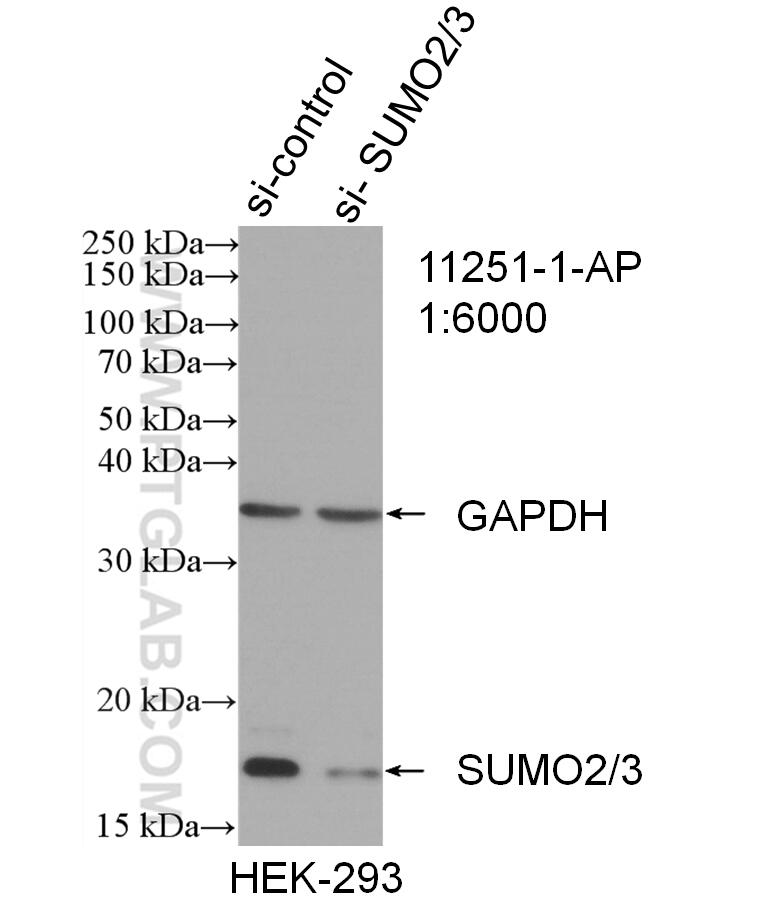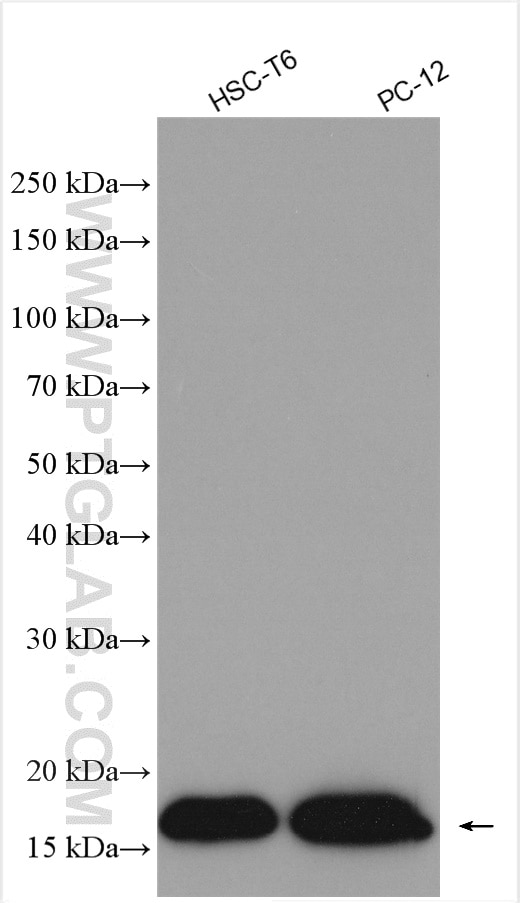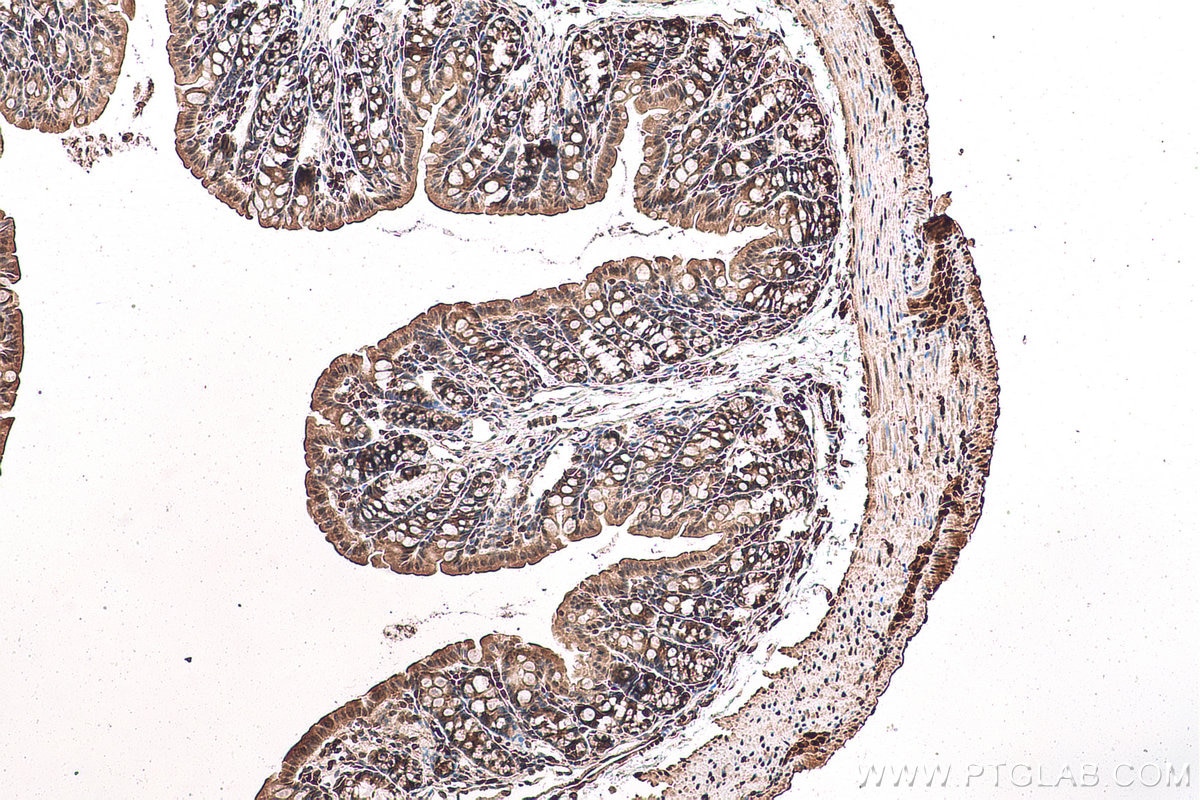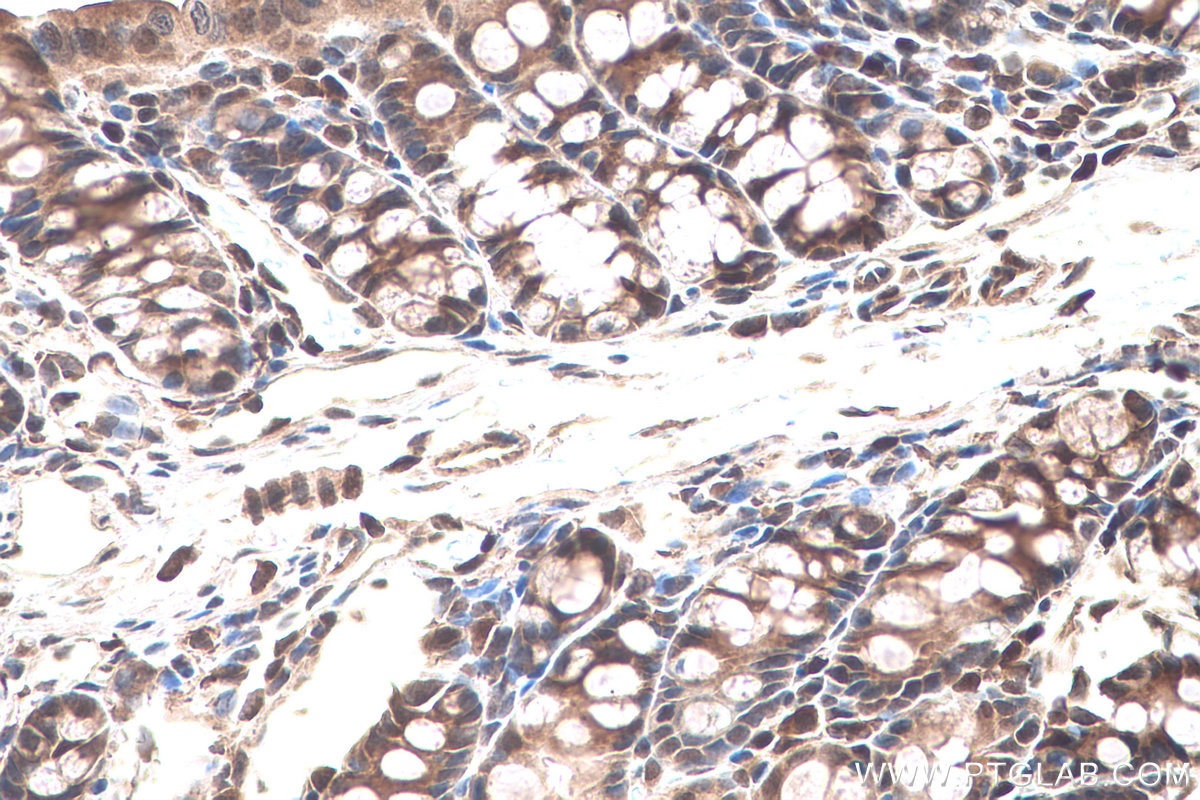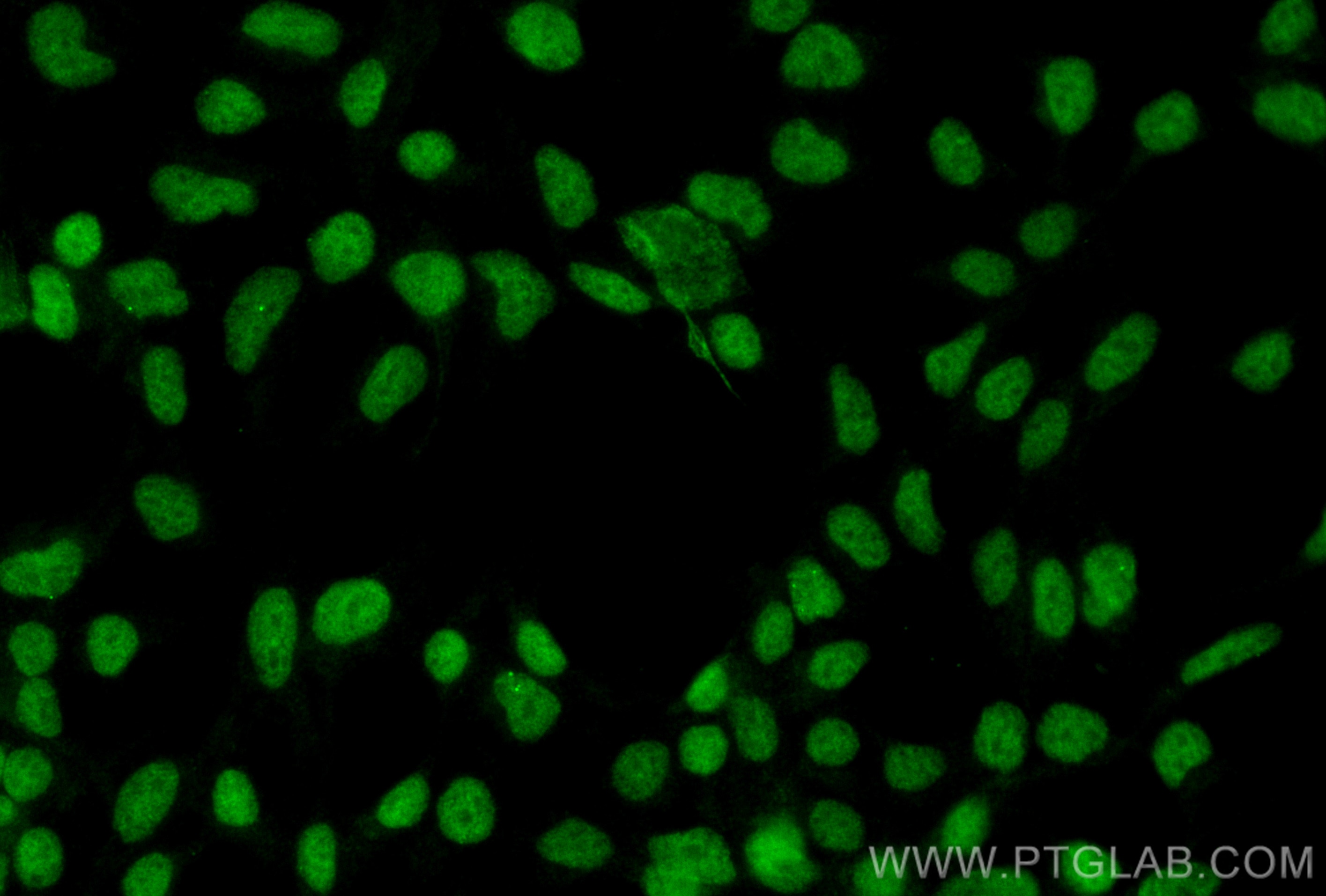Validation Data Gallery
Tested Applications
| Positive WB detected in | HEK-293 cells, HSC-T6 cells, HeLa cells, Jurkat cells, L02 cells, PC-12 cells |
| Positive IHC detected in | mouse colon tissue Note: suggested antigen retrieval with TE buffer pH 9.0; (*) Alternatively, antigen retrieval may be performed with citrate buffer pH 6.0 |
| Positive IF/ICC detected in | HEK-293 cells |
Recommended dilution
| Application | Dilution |
|---|---|
| Western Blot (WB) | WB : 1:500-1:3000 |
| Immunohistochemistry (IHC) | IHC : 1:1000-1:4000 |
| Immunofluorescence (IF)/ICC | IF/ICC : 1:200-1:800 |
| It is recommended that this reagent should be titrated in each testing system to obtain optimal results. | |
| Sample-dependent, Check data in validation data gallery. | |
Published Applications
| KD/KO | See 1 publications below |
| WB | See 15 publications below |
| IHC | See 1 publications below |
| IF | See 3 publications below |
| IP | See 5 publications below |
| CoIP | See 2 publications below |
Product Information
11251-1-AP targets SUMO2/3 in WB, IHC, IF/ICC, IP, CoIP, ELISA applications and shows reactivity with human, mouse, rat samples.
| Tested Reactivity | human, mouse, rat |
| Cited Reactivity | human, mouse |
| Host / Isotype | Rabbit / IgG |
| Class | Polyclonal |
| Type | Antibody |
| Immunogen | SUMO2/3 fusion protein Ag1778 相同性解析による交差性が予測される生物種 |
| Full Name | SMT3 suppressor of mif two 3 homolog 2 (S. cerevisiae) |
| Calculated molecular weight | 11 kDa |
| Observed molecular weight | 11-20 kDa |
| GenBank accession number | BC016775 |
| Gene Symbol | SUMO2 |
| Gene ID (NCBI) | 6613 |
| RRID | AB_2198405 |
| Conjugate | Unconjugated |
| Form | Liquid |
| Purification Method | Antigen affinity purification |
| UNIPROT ID | P61956 |
| Storage Buffer | PBS with 0.02% sodium azide and 50% glycerol , pH 7.3 |
| Storage Conditions | Store at -20°C. Stable for one year after shipment. Aliquoting is unnecessary for -20oC storage. |
Background Information
Ubiquitin is most famous for its function in targeting proteins for degradation by the 26S proteasome, ubiquitin needs to be attached to a substrate in chains (polyubiquitylation) before being recognized by proteasome. Similarly, SUMO (small ubiquitin-related modifier) can be linked to substrates in chains (polysumoylation), SUMO modification has been implicated in many important cellular processes including the control of genome stability, signal transduction, targeting to and formation of nuclear compartments, cell cycle and meiosis. There are 4 confirmed SUMO isoforms in human, SUMO-1, SUMO-2, SUMO-3 and SUMO-4. SUMO-2 and SUMO-3 are nearly identical but are distinct from SUMO-1. SUMO2/3 conjugation was recently widely involved in neuroprotective activities. A substitution (M55V) of SUMO4 was strongly associated with the pathogenesis of type 1 diabetes (T1D) involving NF kappa B related mechanisms.
Protocols
| Product Specific Protocols | |
|---|---|
| WB protocol for SUMO2/3 antibody 11251-1-AP | Download protocol |
| IHC protocol for SUMO2/3 antibody 11251-1-AP | Download protocol |
| IF protocol for SUMO2/3 antibody 11251-1-AP | Download protocol |
| Standard Protocols | |
|---|---|
| Click here to view our Standard Protocols |
Publications
| Species | Application | Title |
|---|---|---|
Sci Adv XAF1 promotes anti-RNA virus immune responses by regulating chromatin accessibility | ||
Theranostics Chlorogenic acid effectively treats cancers through induction of cancer cell differentiation. | ||
mSystems Proteomic Profiling Identifies Kaposi's Sarcoma-Associated Herpesvirus (KSHV)-Encoded LANASIM-Associated Proteins in Hypoxia. | ||
iScience Alternative transcribed 3' isoform of long non-coding RNA Malat1 inhibits mouse retinal oxidative stress | ||
Int J Mol Med SUMO2 modification of Aurora B and its impact on follicular development and atresia in the mouse ovary. | ||
Int J Oncol Transcription factor E2F4 facilitates SUMOylation to promote HCC progression through interaction with LIN9 |
